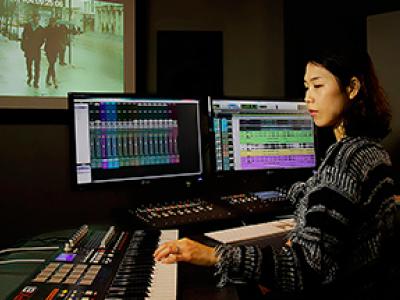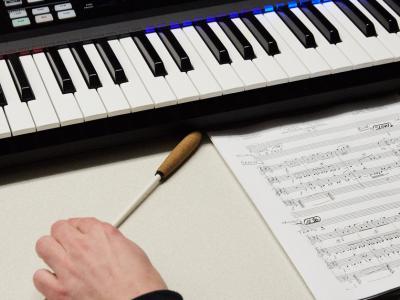What does an Assistant to the Composer do?
Composers—especially those who work on films, television shows, and video games—require lots of additional labor and support to accomplish their job. Most hire and employ a small team that works out of their home or professional studio. The composer’s assistant is one member of this team: a jack-of-all-trades who does whatever is necessary to support the composer, and in so doing gains insight into the composer's process.
Daily Responsibilities
It usually falls to the composer's assistant to keep the studio running efficiently. This might mean renaming and organizing files, installing and updating audio software, straightening up the studio, managing cables, being a messenger when needed, and bouncing stems at the end of the day.
Tech Tasks
The composer's assistant may also assist with recording sessions, mix and edit recorded audio, build custom environments for the composer, redesign setups, program synths, or solve technical problems as they arise. Some composers hire assistants particularly to use their knowledge of sample libraries to improve the composer's MIDI sketches—a field known as MIDI orchestration.
Musical Assignments
Composer's assistants also sometimes assist with the composition process. This might mean notating a passage as the composer plays it, reviewing notated passages as a proofreader, orchestrating from a composer's MIDI sketch, arranging one of the composer's pieces for a specific purpose, booth reading during a recording session, or even writing a short cue in the composer's style.
At a Glance
For a long time, working as a composer’s assistant has been touted as the first step toward a career as a composer, serving as a sort of practical apprenticeship. Today, however, it's far from being solely an educational experience. Most assistants are treated as employees first and foremost, with the consequence that they are expected to bring a seriously developed skillset to the table from day one. The job of an assistant sometimes seems to have more in common with the work of film orchestrators, copyists, and assistant engineers than that of a composer.
Still, the opportunity to learn from the composer—and the other members of the composer's team, which functions almost as a small music production company—should not be undervalued. When assistants feel they have gained enough, usually after a year or two, they break off and head in new directions. Some might join Hollywood music production houses, others might start new freelance careers as orchestrators or copyists, and a lucky few might make it as film, television, video game, or freelance composers.
Assistantships are fairly unlikely to be advertised on conventional job listing websites, so it might be a matter of creating a position rather than finding one. As such, it's doubly important to be assertive and to advocate for one's own importance and usefulness. Aspiring composer's assistants should reach out to established composers whose work they appreciate with an explanation of their skills and abilities, as well as a proposal for how these abilities could improve or aid the composer's process.
- MIDI
- DAWs
- Audio mixing
- Audio engineering
- Music composition
- Orchestration
- Arranging
- Music preparation
- Organization
- Problem solving
Television composer Michael Price (Sherlock) explains it well: “It’s kind of unlikely that you’re going to want anyone with an attitude. You’re going to be working closely together, through late nights, so a sense of humor is going to be important. The composer is going to be dealing with lots of political and big-picture pressure that you may not even be aware of, so they’re unlikely to want someone less organized than them. Or less committed. But what they would, I’m pretty sure, appreciate, is someone who could be proactive, forward-thinking, and solve problems, both technical and musical, before they came up."
Most composers work in a home or external studio, where they're joined by a team that may be as small as one other person (their assistant) or as large as ten employees with different professional specialties. Aspiring assistants should expect early mornings, late nights, and long hours, especially when a deadline is approaching.










